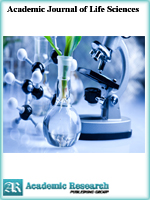Academic Journal of Life Sciences
Online ISSN: 2415-2137
Print ISSN: 2415-5217
Print ISSN: 2415-5217
Quarterly Published (4 Issues Per Year)

Archives
Volume 2 Number 9 September 2016
Comparative Phytochemical screening and invitro Antimicrobial Activity of Aqueous, Ethanolic, and Ethyl Acetate Extracts of Stem Bark and Leaves of Horse Radish (Moringa oleifera) Plant
Authors: Effiong Edet Bassey ; Gwana Adamu Mohammed ; Halima Bala Mohammed ; Muhammed Alhaji Bashir ; Buhari Bagudu Yawuri ; Okeke Ijeoma ; Umeh Sophina Ogonna ; Abubakar Musa ; Mbanusi Bridget
Pages: 61-76
Abstract
This study compared the phytochemical composition of Moringa oleifera leaf and stem bark in vitro antimicrobial potential of its aqueous, ethanolic, and ethyl acetate extracts tested on selected pathogens; E. coli, Staph. aureus, P. aeruginosa, A. niger, A. fumigatus and C. albicans. Plant materials were sampled and prepared as described by Gwana, et al. [1]. Phytochemicals were screened by using the methods as described by Harbone [11], Sofowora [4], Tease and Evans [12]. Antimicrobial activity of the extracts of the leaves and stem bark were assayed, using the agar - disc diffusion method as described by Joanne, et al. [13] and Kirby - Bauer classification method. The study revealed the presence of alkaloids, flavonoids, glycosides, saponins, steroids and tannins. The stem bark extracts has been shown to contain more phytochemicals, which reflects in their ability to show more antimicrobial activity. The aqueous leaf and stem bark extract inhibited all the fungi isolates. Minimum inhibition concentration (MIC) and minimum bactericidal concentration were determined (MBC). The ethanol extracts of the leaf and stem bark at a MIC at l00 mg / ml exhibited antimicrobial activities against all the microorganisms. Ethyl acetate stem bark showed the highest zone of inhibition (16 mm) against E. coli, this is owing to the fact that more secondary metabolites are released. Aqueous leaf and stem extracts gave the highest MBC at 25 mg / ml and 50 mg / ml for A. niger. The variations in the presence of the phytochemicals may be due to the choice of the solvent used in the extraction. The necessity to search for plant - based antimicrobials is increasing due to high cost, reduced efficacy and increased resistance to conventional medicines and there is need to proffers solutions these problems matter.



